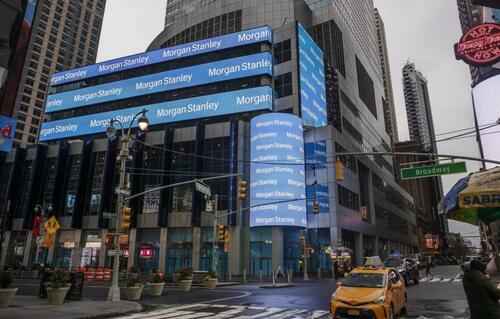Wall Street’s ‘King Of Block Trades’ Targeted In DoJ Investigation
A few weeks have passed since the investing public received an update on the SEC block trading probe that had captured Wall Street’s attention before the market ructions that briefly sent the Nasdaq into a bear market earlier this month emerged. As we learned earlier this year, the probe had ensnared Morgan Stanley and a handful of buy-side clients, most (if not all) of whom had some kind of connection to ex-Morgan Stanley executive Pawan Passi, who ran the bank’s equity syndication desk for years.
So far, Morgan Stanley has appeared to be the nexus of the investigation, as DoJ and SEC investigators examine whether the bank illegally tipped off clients about impending block trades (a practice that was once described by Bloomberg as “a grey area”).
But on Friday, Bloomberg revealed that another firm has been inextricably wrapped up in the probe: CaaS Capital Management, a New York-based hedge fund with more than $4 billion AUM led by Frank Fu, a longtime Wall Street operator. To hear Bloomberg tell it, CaaS has made its money mainly off the types of block trades that the SEC/DoJ are trying to criminalize. Fu and his firm have become so closely associated with this trading strategy, that Bloomberg informally dubbed him Wall Street’s “king of block trading”.
What’s more, business has been good. According to Bloomberg, the firm achieved a return higher than 70% during its first year.
His CaaS Capital Management would focus on block trading, one of the last bastions of old Wall Street, where big slugs of stock are sold through person-to-person negotiation, even cajoling, rather than electronic venues. Many practitioners are bro-y – the type who played college football. For Friday happy hours, Fu’s colleagues unzip their CaaS puffer vests and break out chess boards in a conference room.
Yet Fu, 39, soon managed to establish close ties with investment banks including Morgan Stanley, the juggernaut of the equities world. His pitch: CaaS would “partner” with them, positioning itself for preferential treatment. Prospective investors say CaaS has boasted to them of quickly becoming one of the biggest U.S. funds dedicated to block trading, getting a first look at deals and gaining entry to virtually every IPO in the country. In the firm’s first full year Fu posted a jaw-dropping 76% return.
Fu has enjoyed a charmed career, starting off trading options at Susquehanna, before pivoting to an entirely different style of trading: block trades that required a high-contact approach involving the humans on either side of the trade. His personal relationship with Passi quickly established him as one of the first individuals to “get the call”.
In his early career, Fu focused on types of trading that depend more on math than networking. Born in Shanghai, he came to the U.S. to study at Cornell University in the early 2000s, earning a bachelor’s degree in operations research and industrial engineering and a master’s in financial engineering in 2006, after which he landed at Susquehanna International Group, where he spent two years trading options.
Fu parlayed his reputation and growing influence to launch his own firm, with the backing of Wall Street giants like BlackRock.
Fu set up his own shop with early backing from BlackRock Inc. and New Holland Capital. He told investors he planned to position himself as an aide to banks, which after the 2008 financial crisis weren’t able to pile on big blocks of stock like they used to. In more recent months, CaaS has told prospective investors it had ties to about 30 banks.
“Due to the breadth and strength of these relationships, CaaS has earned a reputation in the market as the firm that receives an early, if not first, call,” the firm wrote in a recent marketing presentation.
Fu wasn’t flashy with his growing wealth. One associate described him as one of the cheapest dinner meetings on Wall Street, typically ordering just an entree and a Diet Coke. He bought investment properties in Weehawken, New Jersey, and surrounding areas and started a foundation with his wife, which has donated to Cornell and Horace Mann, a private school in the Bronx.
He quickly became one of the best-known buyers of blocks of shares, which he used computer modeling to analyze to ensure his firm bought shares at a reasonable price. Regulatory filings show that CaaS was there to hoover up blocks of shares dumped by prime brokers on Archegos’s behalf. Typically, CaaS holds positions anywhere from a few days, to a few months.
But some of Fu’s counterparties have noticed what they described as ‘irregularities’ in his trading style.
Not every bank took up Fu’s offer. One banker, speaking on the condition that he and his employer not be named, said his firm twice sold Fu a block of shares from its own book, but each time noticed a drop in the public price before the transaction was finished, reducing the bank’s proceeds. Suspicious that the drops might not be coincidental, the banker made a personal decision a few years ago to stop trusting Fu with new business.
Now, Fu and Morgan Stanley’s Passi are reportedly two among a group of more than a dozen Wall Street executives who have found themselves in investigators’ crosshairs. As one lawyer who spoke with BBG acknowledged, the line between what’s legal and illegal is nebulous, at best.
“The definition of material nonpublic information is pretty broad,” and can be murky, said Dan Viola, a partner overseeing law firm Sadis & Goldberg’s regulatory and compliance practice. “Funds shorting after such calls are taking an aggressive stance. Regulators appear to be concerned about a banker giving confidential information to preferred customers at the expense of the person who is selling the big block.”
The big question now: can prosecutors actually convince a jury that Fu, Passi and others intentionally violated laws governing the dissemination of material non-public information?
Tyler Durden
Sun, 03/20/2022 – 17:00


Recent Comments